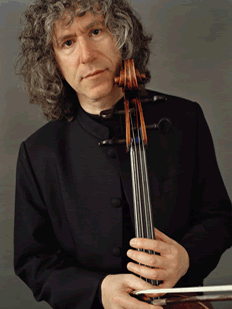|
Symphony
SRS SEASON ENDS WITH RESOUNDING TA-TA-TA-BANG
by Terry McNeill
Sunday, June 1, 2025
Symphony
YOUTHFUL VIRTUOSITY ON DISPLAY AT USO'S MAY CONCERTS
by Peter Lert
Saturday, May 17, 2025
Symphony
MYSTICAL PLANETS AND LIVELY GERSHWIN ORTIZ AT FINAL SRS CONCERT
by Peter Lert
Sunday, May 4, 2025
Symphony
VSO'S CONCERT MUSIC OF TIME, MUSIC OF PLACE
by Peter Lert
Sunday, April 27, 2025
Choral and Vocal
VOCAL ELEGANCE AND FIRE AT THE 222'S RECITAL APRIL 26
by Pamela Hicks Gailey
Saturday, April 26, 2025
CANTIAMO SONOMA SINGS AN INSPIRED GOOD FRIDAY MOZART REQUIEM CONCERT
by Pamela Hicks Gailey
Friday, April 18, 2025
DRAMATIC SHOSTAKOVICH SYMPHONY CLOSES PHILHARMONIC'S 25TH SEASON
by Terry McNeill
Sunday, April 13, 2025
LARGE COLLEGE OF MARIN AUDIENCE GREETS STOPHER ARTISTRY
by Terry McNeill
Saturday, April 5, 2025
Chamber
FRISSON DELIVERS SHIVERS OF DELIGHT
by Abby Wasserman
Sunday, March 30, 2025
OLD AND MOSTLY NEW IN SRS MARCH CONCERT IN WEILL
by Peter Lert
Saturday, March 22, 2025
|
 |
 Steven Isserlis |
STIRRED, NOT SHAKEN
by Steve Osborn
Friday, January 8, 2010
In a 1778 letter to his father, Mozart observed, “It is far easier to play a thing quickly than slowly.” The truth of Mozart’s observation has been borne out repeatedly in the intervening centuries, as virtuosos of all stripes have sought to dazzle their audiences with high-speed prestidigitation, often at the expense of musical beauty.
Not so with cellist Steven Isserlis and pianist Kirill Gerstein, who bewitched a capacity crowd at Santa Rosa’s Newman Auditorium Jan. 8 with a recital dominated by slow playing of maximum expressiveness. To be sure, the two of them often made their fingers fly through the air with the greatest of ease, but what sticks in the mind are their languid strolls through the musical landscape, with repeated stops to smell the roses.
The concert was much anticipated in Santa Rosa, where the memory of Isserlis still lingers several decades after his first concerts here, near the beginning of his storied career. “I have to report a rather ghastly fact,” he told the audience during one of his witty introductions. “The first time I played in Santa Rosa, Kirill had not yet been born.”
Now 51, Isserlis still sports a mop of curly shoulder-length hair that he flings to and fro with reckless abandon. In contrast, the 30-year-old Gerstein is crew cut, and his movements on the piano bench are relatively confined.
This clash of styles and appearance was on full display in the opening piece, the Cello Sonata in C by Benjamin Britten. Protectively enfolding his Stradivarius, Isserlis alternately gazed up in the air to his left or glanced at a score on his right, often flinging his mane while in transit. Meanwhile, his left foot floated up and down, following the center of gravity.
The sound that emerged from all this rocking and swaying was of the utmost delicacy, rendered ever so much more so by Isserlis’s use of gut strings. Instead of the jagged edges of their modern, metallic counterparts, which often make cellos sound like a swarm of bees, gut strings produce a rounded, soothing tone, more akin to a purring cat.
Gerstein contributed to the delicacy by barely grazing the keys of the piano and keeping himself firmly in the background. The net effect of all this quietude was a heightened concentration from the audience, which listened to the two musicians in rapt silence.
The Britten — which most of the audience had probably never heard — proved to be a captivating sonata that makes full use of the cello’s sonic possibilities. There were plenty of ringing pizzicatos, slithering glissandos and spiccato bowings. The real standout, however, was the central movement, marked “Elegia: Lento,” where Isserlis milked each note to its full potential. The tone on his low C string was absolutely gorgeous.
A slow third movement, an Intermezzo, was also the highlight of the next piece, Isserlis’ own transcription of a neglected Schumann violin sonata. The sonata has a long and curious history, well told by Isserlis in the program notes. Suffice to say that the transcription sounds great on a cello, provided it’s played by someone who’s able to traverse the cello’s long fingerboard as if it were a violin’s.
Isserlis proved fully capable of playing his cello like a violin, but all the virtuosic display was mere prelude to the heart-wrenching third movement, which Isserlis sang to perfection. All the musical elements of Schumann’s greatest songs were here, except for the lyrics, which would have been superfluous in any event.
Gerstein was primarily in the shadows during both the Britten and Schumann sonatas, but the Rachmaninoff sonata, which occupied the second half, was a different story. Rather than “cello sonata,” the work might be more accurately termed “concerto for piano with one-person cello orchestra.” Or better yet, “Russian novel for two players.”
One could never accuse Rachmaninoff of brevity, and this sonata, with its meandering rivers of sound, can overmaster all but the most cogent performers. Fortunately, both Isserlis and Gerstein proved up to the task, imparting a rhythmic force and narrative drive that sustained the work from its opening cascades of notes to its majestic ending some forty minutes later.
Gerstein, who just won the coveted $300,000 Gilmore Artist Award, proved particularly adept at dynamics, leading off the sonata with a stunning decrescendo that moved from fortissimo to pianissimo in the flicker of an eyelash. Isserlis was great throughout, but once again his most memorable playing occurred in the slow third movement, where he savored the quality of each note, bright glimmers of warmth in a stark Russian landscape.
The instantaneous standing ovation produced but one encore: Fauré’s “Sicilienne,” a suitably languid piece that calmed the audience. When it was over, Isserlis held his cello upside down to prove that he had poured every last note out of it, at least for this memorable concert.
|
